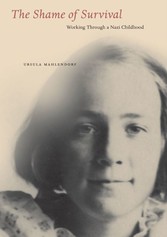Search and Find
Service
Shame of Survival - Working Through a Nazi Childhood
While we now have a great number of testimonials to the horrors of the Holocaust from survivors of that dark episode of twentieth-century history, rare are the accounts of what growing up in Nazi Germany was like for people who were reared to think of Adolf Hitler as the savior of his country, and rarer still are accounts written from a female perspective. Ursula Mahlendorf, born to a middle-class family in 1929, at the start of the Great Depression, was the daughter of a man who was a member of the SS at the time of his early death in 1935. For a long while during her childhood she was a true believer in Nazismand a leader in the Hitler Youth herself. This is her vivid and unflinchingly honest account of her indoctrination into Nazism and of her gradual awakening to all the damage that Nazism had done to her country. It reveals why Nazism initially appealed to people from her station in life and how Nazi ideology was inculcated into young people. The book recounts the increasing hardships of life under Nazism as the war progressed and the chaos and turmoil that followed Germany's defeat.In the first part of this absorbing narrative, we see the young Ursula as she becomes an enthusiastic member of the Hitler Youth and then goes on to a Nazi teacher-training school at fifteen. In the second part, which traces her growing disillusionment with and anger at the Nazi leadership, we follow her story as she flees from the Russian army's advance in the spring of 1945, works for a time in a hospital caring for the wounded, returns to Silesia when it is under Polish administration, and finally is evacuated to the West, where she begins a new life and pursues her dream of becoming a teacher.In a moving Epilogue, Mahlendorf discloses how she learned to accept and cope emotionally with the shame that haunted her from her childhood allegiance to Nazism and the self-doubts it generated.
All prices incl. VAT













